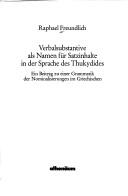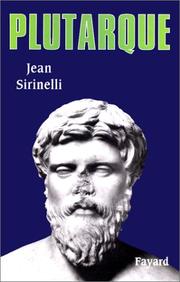| Listing 1 - 10 of 13 | << page >> |
Sort by
|
Book
ISBN: 9780521661294 1322882053 0521661293 9781316128640 9781139023702 1316128644 1139023705 9781316129739 131612973X 1316121011 1316133001 1316119904 1316130827 1316127559 9781316121016 9781316133002 9781316119907 9781316130827 9781316127551 Year: 2014 Publisher: Cambridge [etc.] Cambridge University Press
Abstract | Keywords | Export | Availability | Bookmark
 Loading...
Loading...Choose an application
- Reference Manager
- EndNote
- RefWorks (Direct export to RefWorks)
This volume assembles fourteen highly influential articles written by Michael H. Jameson over a period of nearly fifty years, edited and updated by the author himself. They represent both the scope and the signature style of Jameson's engagement with the subject of ancient Greek religion. The collection complements the original publications in two ways: firstly, it makes the articles more accessible; and secondly, the volume offers readers a unique opportunity to observe that over almost five decades of scholarship Jameson developed a distinctive method, a signature style, a particular perspective, a way of looking that could perhaps be fittingly called a 'Jamesonian approach' to the study of Greek religion. This approach, recognizable in each article individually, becomes unmistakable through the concentration of papers collected here. The particulars of the Jamesonian approach are insightfully discussed in the five introductory essays written for this volume by leading world authorities on polis religion.
Greek prose literature --- History and criticism --- Greece --- Religion --- Greece -- Religion. --- Greek prose literature -- History and criticism. --- Greek prose literature. --- Religion. --- Languages & Literatures --- Greek & Latin Languages & Literatures --- E-books --- History and criticism. --- Greece -- Religion --- Greek prose literature -- History and criticism
Book

ISBN: 0674996364 9780674996366 Year: 2009 Volume: 508 Publisher: Cambridge: Harvard university press,
Abstract | Keywords | Export | Availability | Bookmark
 Loading...
Loading...Choose an application
- Reference Manager
- EndNote
- RefWorks (Direct export to RefWorks)
Works by authors such as Philitas of Cos, Alexander of Aetolia, Hermesianax of Colophon, Euphorion of Chalcis and, especially Parthenius of Nicaea, who composed the mythograpical Sufferings in Love, represent rich inventiveness in Hellenistic prose and poetry from the fourth to the first century BCE.
Greek poetry, Hellenistic --- Greek prose literature --- Greek prose literature, Hellenistic --- Languages & Literatures --- Greek & Latin Languages & Literatures --- Hellenistic Greek poetry --- Hellenistic Greek prose literature --- Greek literature, Hellenistic --- Greek literature --- Geschichte 336 v. Chr.-31 v. Chr. --- Greek prose literature, Hellenistic - Translations into English --- Greek poetry, Hellenistic - Translations into English --- Greek prose literature - Translations into English --- Poésie grecque hellénistique --- Prose grecque --- Translations into English --- Traductions anglaises --- Greek poetry, Hellenistic. --- Greek prose literature, Hellenistic.
Book
Year: 1998 Publisher: Oxford [England] New York Clarendon Press Oxford University Press
Abstract | Keywords | Export | Availability | Bookmark
 Loading...
Loading...Choose an application
- Reference Manager
- EndNote
- RefWorks (Direct export to RefWorks)
Book
ISSN: 11504129 ISBN: 2251390316 9782251390314 Year: 1999 Volume: 38 Publisher: Paris: Les Belles Lettres,
Abstract | Keywords | Export | Availability | Bookmark
 Loading...
Loading...Choose an application
- Reference Manager
- EndNote
- RefWorks (Direct export to RefWorks)
Hoofse roman
---
Roman courtois
---
Grèce ancienne
---
#BIBC:ruil

ISBN: 3610090057 Year: 1987 Volume: 152 Publisher: Frankfurt am Main Athenäum
Abstract | Keywords | Export | Availability | Bookmark
 Loading...
Loading...Choose an application
- Reference Manager
- EndNote
- RefWorks (Direct export to RefWorks)
Greek language --- Grec --- Gerund --- Thucydides --- Language --- Glossaries, etc. --- -Greek language --- -Greek prose literature --- -Greek literature --- Classical languages --- Indo-European languages --- Classical philology --- Greek philology --- Noun --- Verbals --- Criticism, Textual --- -Fukidid --- Tucídides --- Thukydides --- Thoukydidēs --- Tucidide --- תוקידידיס --- Θουκυδίδης --- Greek prose literature --- Criticism, Textual. --- Noun. --- Verbals. --- Language. --- -Noun --- -Language --- -Thucydide --- Thoukudides --- Greek literature --- Thucydide --- Grieks. Naamwoorden op "-sis". --- Thucydides. Naamwoord. --- Grec. Nominalisation. --- Grec. Substantifs en "-sis". --- Thucydide. Substantif. --- Grieks. Nominalisatie. --- Fukidid
Book
ISBN: 9781107062726 1107062721 9781107477308 9781107638761 9781316150030 1316150038 9781316147252 1316147258 1107477301 1316150291 1316146995 1316150550 131614951X 1107638763 1316149250 1316149773 1322293406 Year: 2014 Volume: *26 Publisher: Cambridge: Cambridge university press,
Abstract | Keywords | Export | Availability | Bookmark
 Loading...
Loading...Choose an application
- Reference Manager
- EndNote
- RefWorks (Direct export to RefWorks)
The political instability of the Severan Period (AD 193-235) destroyed the High Imperial consensus about the Roman past and caused both rulers and subjects constantly to re-imagine and re-narrate both recent events and the larger shape of Greco-Roman history and cultural identity. This book examines the narratives put out by the new dynasty, and how the literary elite responded with divergent visions of their own. It focuses on four long Greek narrative texts from the period (by Cassius Dio, Philostratus and Herodian), each of which constructs its own version of the empire, each defined by different Greek and Roman elements and each differently affected by dynastic change, especially that from Antonine to Severan. Innovative theories of narrative are used to produce new readings of these works that bring political, literary and cultural perspectives together in a unified presentation of the Severan era as a distinctive historical moment
Greek prose literature. --- HISTORY / Ancient / General. --- Cassius Dio Cocceianus. --- Herodian. --- Philostratus, --- Rome --- History --- Greek prose literature --- Cassius Dio Cocceianu --- Greek literature --- Filostrat, Flaviĭ, --- Filóstrato, --- Filostrato, Flavio, --- Filostrato, --- Filostratos, Flawiusz, --- Flavio Filostrato, --- Flavius Philostratus, --- Flawiusz Filostratos, --- Philostratos, --- Philostratos, Phlauios, --- Philostratus, Flavius --- Philostratus, Flavius, --- Philostratus --- Phlauios Philostratos, --- Erodiano --- Héródianos --- Herodianus --- Herodijan --- Herodian, --- Cassius Dio Cocceianus --- Dion Cassius Cocceianus --- Kasjusz Dion Kokcejan --- Cassio Dione --- Dione, Cassio --- Cassius Dio --- Kasij Dion --- Dion Cassius --- Dion Kasios Kokeianosi --- Lucio Cassio Dione --- Dio Cassius --- Casio, Dion --- Dio Cocceianus, Lucius Claudius Cassius --- Philostratus, - the Athenian, - active 2nd century-3rd century --- Rome - History - Severans, 193-235
Book
ISBN: 9783110342000 3110342006 9783110342512 3110342510 3110373491 9783110342529 3110342529 9783110373493 3110555522 9783110555523 Year: 2014 Volume: 23 Publisher: Berlin ; Boston De Gruyter
Abstract | Keywords | Export | Availability | Bookmark
 Loading...
Loading...Choose an application
- Reference Manager
- EndNote
- RefWorks (Direct export to RefWorks)
Dem Athener Isokrates (ca. 436-338 v.Chr.) schreibt man seit jeher eine maßgebliche Rolle bei der ideengeschichtlichen Trennung von Rhetorik und Philosophie zu. Besonders die historischen Exempla in seinen Reden galten dabei lange Zeit als Beleg dafür, dass der ,Erbe der Sophistik' als Hauptgegner Platons den Anspruch sachlicher Moralität und Wahrhaftigkeit dem Zweck der Demonstration rhetorischer Brillanz untergeordnet habe. Thomas Blank untersucht in seiner Dissertation die Verwendung des bei Isokrates besonders prominenten Exemplums Sparta in dessen gesamtem Werk. Dabei werden erstmals Isokrates' eigene Bemerkungen zur technischen Gültigkeit bestimmter Argumentationsweisen für die Interpretation berücksichtigt. Es lässt sich zeigen, dass die scheinbaren Widersprüche im isokratischen Spartabild Folge einer Vorführung konkurrierender Argumentationstypen sind. Isokrates' technische Kommentare dienen als Hinweise darauf, dass nur manche der von ihm präsentierten Argumente plausibel sein sollen. Gegen die These von der tyrannischen Macht des logos setzt er, Platon keineswegs fernstehend, die Forderung nach Moralität der Rede und fordert die Athener am Beispiel Spartas dazu auf, rhetorisch bekundete moralische Ansprüche auch in praktisches Handeln umzusetzen.
Greek prose literature --- Prose grecque --- History and criticism. --- Histoire et critique --- Isocrates --- Criticism and interpretation. --- Political and social views. --- Sparta (Extinct city) --- Sparte (Ville ancienne) --- Politics and government. --- Politique et gouvernement --- Isocrates. --- Lacedaemon (Extinct city) --- Lakedaímon (Extinct city) --- Sparta (Ancient city) --- Greece --- Antiquities --- Isokrat --- Isokratēs --- Isocrate --- Yi-suo-ke-la-di --- Izokrates --- Ἰσοκράτης --- Sparta. --- rhetoric.

ISBN: 2213603715 9782213603711 Year: 2000 Publisher: Paris: Fayard,
Abstract | Keywords | Export | Availability | Bookmark
 Loading...
Loading...Choose an application
- Reference Manager
- EndNote
- RefWorks (Direct export to RefWorks)
Authors, Greek --- Philosophy, Ancient --- Greek prose literature --- Ecrivains grecs --- Philosophie ancienne --- Prose grecque --- Biography --- History and criticism --- Biographie --- Histoire et critique --- Plutarch --- Biographers --- Philosophers --- Priests --- -Philosophers --- -Priests --- -Pastors --- Clergy --- Priesthood --- Scholars --- Authors --- Greek authors --- Plutarchus --- Plutarkh --- Plutarkhus --- Plutarque --- Plutarco --- Plutarchus, --- Plutarch, --- Ploutarchos --- Blūtārkhūs --- Плутарх --- Плутах --- Plutarh --- פלוטארכוס --- پلوتارخ --- Πλούταρχος, --- Pseudo-Plutarch --- Plutarkhosz --- Biography. --- -Plutarch --- -Greek authors --- Pastors --- Plutarch. --- Ploetarchos --- Plutarchus Chaeronensis --- Biographers - Greece - Biography. --- Philosophers - Greece - Biography. --- Priests - Greece - Delphi - Biography. --- Authors, Greek - Biography.
Book
ISBN: 9780691144573 9780691144580 Year: 2011 Volume: *8 Publisher: Princeton ; Oxford Princeton University Press
Abstract | Keywords | Export | Availability | Bookmark
 Loading...
Loading...Choose an application
- Reference Manager
- EndNote
- RefWorks (Direct export to RefWorks)
Fables, Greek --- Greek prose literature --- Literary form --- Literature and society --- Popular culture and literature --- Popular culture --- History and criticism. --- History --- Aesop --- Influence. --- Aesop's fables. --- Culture, Popular --- Mass culture --- Pop culture --- Popular arts --- Communication --- Intellectual life --- Mass society --- Recreation --- Culture --- Literature and popular culture --- Literature --- Literature and sociology --- Society and literature --- Sociology and literature --- Sociolinguistics --- History and criticism --- Social aspects --- Aesopus --- Ezop --- Esop --- Esopo --- Esope --- Aisōpos --- Esopus --- Ezovbos --- Ezopos --- Īcāp --- Isop --- אזוף --- אזופוס --- איסופוס --- עזאפ --- イソップ --- 伊索 --- Aisōpou mythoi --- Fables of Aesop --- Fabulae Aesopi --- Īcāp kataikaḷ --- Aesop in Mexico --- Μῦθοι (Aesop's fables) --- Mythoi (Aesop's fables) --- Corpus Fabularum Aesopicarum --- Aesopi --- Äsop
Book
ISBN: 9782913667327 2913667325 Year: 2012 Volume: 48 Publisher: Nancy: Association pour la diffusion de la recherche sur l'Antiquité,
Abstract | Keywords | Export | Availability | Bookmark
 Loading...
Loading...Choose an application
- Reference Manager
- EndNote
- RefWorks (Direct export to RefWorks)
Les auteurs antiques comptaient les syllabes courtes et longues. Les auteurs étudient méthodiquement cette technique afin de révéler l'architecture des textes.
Numbers in literature --- Classical literature --- Nombres dans la littérature --- Littérature ancienne --- Themes, motives --- Thèmes, motifs --- Greek language --- Latin literature --- Greek literature --- Latin language --- Metrics and rhythmics --- History and criticism --- Latin prose literature. --- Greek prose literature. --- Symbolisme des nombres --- Versification --- Latin (langue) --- Grec (langue) --- Metrics and rhythmics. --- History and criticism. --- Dans la littérature --- Métrique et rythmique --- Nombres --- Aspect symbolique --- Nombres dans la littérature --- Littérature ancienne --- Thèmes, motifs --- Métrique et rythmique. --- Greek language - Metrics and rhythmics --- Latin literature - History and criticism --- Greek literature - History and criticism --- Latin language - Metrics and rhythmics --- Dans la littérature --- Métrique et rythmique.
| Listing 1 - 10 of 13 | << page >> |
Sort by
|

 Search
Search Feedback
Feedback About UniCat
About UniCat  Help
Help News
News